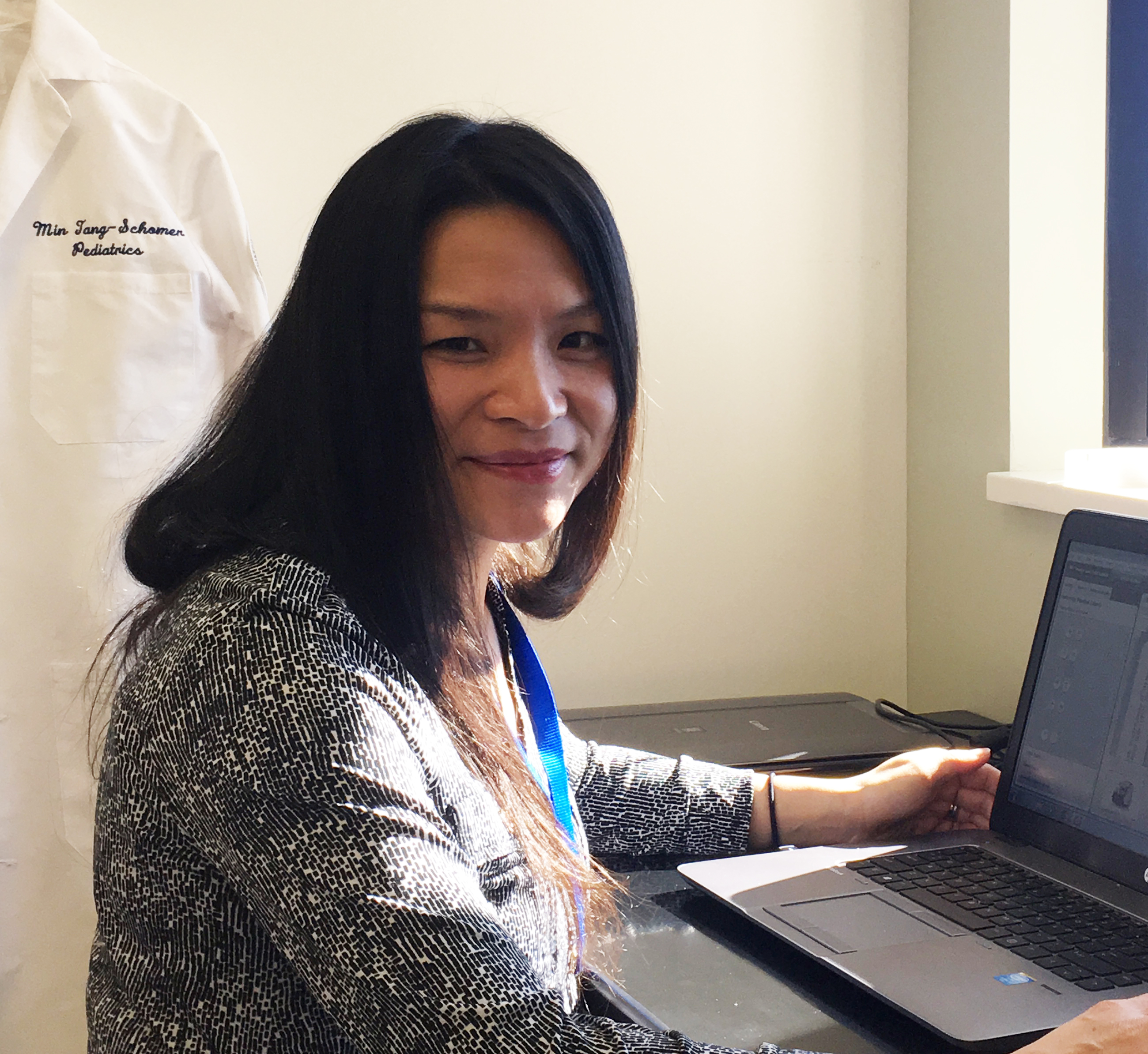Cancer Technologies
(F-238) Personalized Drug Testing with Patient-derived Tumor Models – Experiments and Big Data Approach
Friday, October 13, 2023
9:30 AM - 10:30 AM PDT
Location: Exhibit Hall - Row F - Poster # 238

Min Tang-Schomer, PhD
Assistant Professor
UConn Health Center
Marlborough, Connecticut, United States- AT
Ashley Thammavongsa
Student
University of Connecticut, United States
Presenting Author(s)
Co-Author(s)
Introduction:: Malignant brain tumors are one of the deadliest types of cancer in the United States, causing an estimated 18,600 deaths in adults and 1,190 deaths in children during 2021. Treatment development for brain cancer faces unique challenges including the requirement of anti-tumor drugs penetrating the blood-brain barrier (BBB). Psychiatric medications have been proven to freely penetrate the brain. Shared molecular pathways have been identified between certain brain tumors and neurological conditions, indicating potential overlapping drug targets between cancerous and non-cancerous brain disorders. To explore new treatment options, the re-purposing of psychiatric drugs has been investigated.
Compounded with a lack of brain tumor type-specific cell lines, the development of targeted therapies warrants patient-derived tumor models that can faithfully represent the molecular makeup of the primary tumor. We have extended our previous work using our 3D brain tissue models to generate patient-derived brain tumor models for all major types of pediatric brain cancers.
Here, we combined in vitro drug testing and big data approach to test the hypothesis is of re-purposing psychiatric drugs for brain tumor treatment. In vitro drug testing on medulloblastoma patient-derived tumor models demonstrated the effectiveness of selective drugs such as thioridazine that is FDA-approved for schizophrenia treatment. NIH’s All of Us Research Data Browser provides a rich database of all human disease conditions and a tool to explore the association between diseases and other environmental factors such as treatment history. We embarked on a big data-based approach to explore demographic correlations between brain cancer and schizophrenia populations.
Materials and Methods:: Human patient brain tissue is obtained from tumor resection surgery at the Connecticut Children’s Medical Center (CCMC), with patients’ consent and approval by institutional IRBs. Drug testing on patient tumor cells was performed on a high-throughput imaging platform. These drugs were FDA-approved for treating non-cancerous neurological and psychiatric conditions. For the big-data approach, the data was gathered from the NIH’s All of Us Research Data Browser pool of 201,920 participants and more than 24,530 cases from the CDC’s National Program of Cancer Registries. Descriptive and explanatory statistics were performed.
Results, Conclusions, and Discussions:: Findings from our combined approach strongly indicate the feasibility of re-purposing psychiatric drugs for mitigating certain brain tumor types. Our studies also provide a more efficient approach to expediate drug development by identifying the effects of a drug treatment on the demographic patterns of different diseases. Leveraging population-based data analytics for personalized drug testing would provide a powerful tool for developing drug-repurposing strategies, overcoming the prohibitive barriers from lab to the clinics. Using data analytic tools on population-based information we can identify the effects of a drug treatment on the demographic patterns of different medical conditions, thus guiding drug repurposing studies for personalized drug testing from psychiatric disorder to brain cancer.
Acknowledgements (Optional): : American Brain Tumor Association Discovery Grant Supported by an Anonymous Family Foundation to Min T-S. NIH All of US.
References (Optional): : [1] Tang-Schomer MD, et al. PNAS, 2014. [2] Tang-Schomer MD, et al. Translational Oncology, 2021.
Compounded with a lack of brain tumor type-specific cell lines, the development of targeted therapies warrants patient-derived tumor models that can faithfully represent the molecular makeup of the primary tumor. We have extended our previous work using our 3D brain tissue models to generate patient-derived brain tumor models for all major types of pediatric brain cancers.
Here, we combined in vitro drug testing and big data approach to test the hypothesis is of re-purposing psychiatric drugs for brain tumor treatment. In vitro drug testing on medulloblastoma patient-derived tumor models demonstrated the effectiveness of selective drugs such as thioridazine that is FDA-approved for schizophrenia treatment. NIH’s All of Us Research Data Browser provides a rich database of all human disease conditions and a tool to explore the association between diseases and other environmental factors such as treatment history. We embarked on a big data-based approach to explore demographic correlations between brain cancer and schizophrenia populations.
Materials and Methods:: Human patient brain tissue is obtained from tumor resection surgery at the Connecticut Children’s Medical Center (CCMC), with patients’ consent and approval by institutional IRBs. Drug testing on patient tumor cells was performed on a high-throughput imaging platform. These drugs were FDA-approved for treating non-cancerous neurological and psychiatric conditions. For the big-data approach, the data was gathered from the NIH’s All of Us Research Data Browser pool of 201,920 participants and more than 24,530 cases from the CDC’s National Program of Cancer Registries. Descriptive and explanatory statistics were performed.
Results, Conclusions, and Discussions:: Findings from our combined approach strongly indicate the feasibility of re-purposing psychiatric drugs for mitigating certain brain tumor types. Our studies also provide a more efficient approach to expediate drug development by identifying the effects of a drug treatment on the demographic patterns of different diseases. Leveraging population-based data analytics for personalized drug testing would provide a powerful tool for developing drug-repurposing strategies, overcoming the prohibitive barriers from lab to the clinics. Using data analytic tools on population-based information we can identify the effects of a drug treatment on the demographic patterns of different medical conditions, thus guiding drug repurposing studies for personalized drug testing from psychiatric disorder to brain cancer.
Acknowledgements (Optional): : American Brain Tumor Association Discovery Grant Supported by an Anonymous Family Foundation to Min T-S. NIH All of US.
References (Optional): : [1] Tang-Schomer MD, et al. PNAS, 2014. [2] Tang-Schomer MD, et al. Translational Oncology, 2021.
